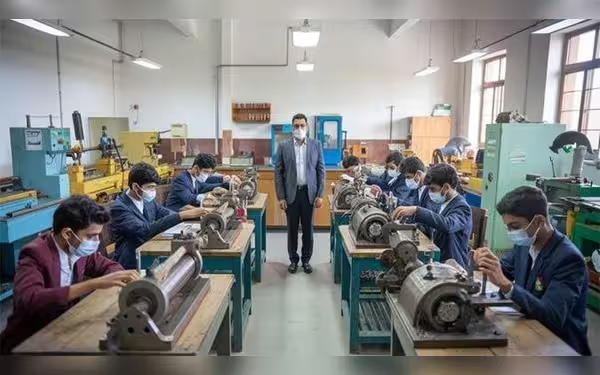Saturday, November 16, 2024 07:33 PM
Global Demand for Skilled Engineers: A Boon for Pakistan
- Rising global demand for skilled engineers offers opportunities.
- Practical training is essential for graduates' employability.
- Mechanical engineering fields are expanding rapidly.
 Image Credits: nation_pk
Image Credits: nation_pkThe rising global demand for skilled engineers presents a significant opportunity for Pakistan's youth, emphasizing the need for practical training.
The global demand for skilled engineers is on the rise, presenting a significant opportunity for Pakistan. As industries evolve and technology advances, the need for professionals who can adapt and innovate has never been greater. Mechanical engineering, in particular, stands out as a field ripe with potential for career advancement. With the right education and practical training, Pakistani graduates can position themselves to meet this growing demand.
Dr. Muhammad from Government College University, Faisalabad, emphasizes that mechanical engineering education is crucial in today’s fast-paced world. He points out that while Pakistani institutions offer various levels of mechanical engineering education, many fall short in integrating modern technology into their curricula. He states, “In future, only practical skills will ensure well-paid jobs, and now is the ripe time to bid farewell to our outdated curriculum.” This highlights a pressing issue: the gap between theoretical knowledge and practical application.
Every year, thousands of students graduate without the hands-on experience necessary to thrive in the job market. This lack of practical training not only hampers their career prospects but also contributes to rising unemployment and associated health issues. Dr. Muhammad urges policymakers to reassess the current curriculum, which he believes is overly focused on theory. He insists that graduates must possess practical skills to navigate the evolving job landscape effectively.
Ali Hassan, a recent graduate of a mechanical technology diploma program, echoes these sentiments. He believes that educators should prioritize practical training over theoretical lessons. Hassan is committed to gaining as much practical experience as possible to enhance his employability. He encourages fellow graduates to seek internships, industry placements, and hands-on projects to better understand the needs of the industrial sector. “Building a network with industry professionals can lead to valuable knowledge and job opportunities,” he advises.
As the world embraces the artificial intelligence (AI) revolution, Hassan stresses the importance of launching short courses that align with emerging fields. He recognizes that challenges and opportunities are intertwined, and preparing the youth for this new reality is essential.
Tahir Khan, a recruitment specialist in the automotive industry, sheds light on the skills and qualifications that employers prioritize. He notes that companies are looking for graduates who possess a solid foundation in both practical skills and theoretical knowledge. In the automotive and manufacturing sectors, hands-on experience is crucial. Graduates who have participated in internships or industry placements are often preferred by employers, as they bring practical experience that aligns with industry needs.
Interestingly, Khan challenges the notion that Pakistan’s educational curriculum is outdated. He argues that the industry is receiving skilled and knowledgeable candidates, thanks to modern teaching methods and practical training. Dr. Muhammad Ali further elaborates on the diverse career paths available to mechanical engineering graduates, including roles in automotive, energy, manufacturing, and construction sectors. He highlights that many graduates are successfully working as automotive engineers, design engineers, or quality control engineers.
Moreover, mechanical engineers play a vital role in the energy sector, which impacts every segment of society. Skilled professionals are essential for redesigning and maintaining energy systems, improving efficiency, and developing sustainable solutions. Dr. Muhammad Ali concludes, “The demand for mechanical engineers is surging globally, and we must capitalize on this opportunity.”
The rising global demand for skilled engineers presents a golden opportunity for Pakistan. By focusing on practical training and modernizing educational curricula, the country can equip its youth with the skills needed to thrive in a competitive job market. As industries continue to evolve, it is imperative that both educational institutions and policymakers work together to ensure that graduates are prepared to meet the challenges of tomorrow.













